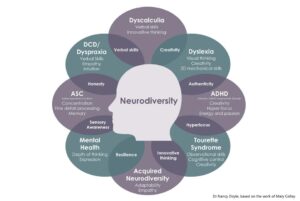Article menu
Right now, charities and organisations are desperately trying to fill vacancies and shouting about diversity, equality and inclusion (DEI) initiatives. Yet there’s a group that’s often overlooked in diversity conversations and hiring efforts: neurodivergent people. Around 10% of the UK population is neurodivergent and this should be reflected in the workplace. Here we look at how and why you should be hiring neurodiverse candidates.
What is Neurodiversity?
‘Neurodiversity’ refers to the idea that there are different variations in human brain function. The term refers to the diversity of all people, but is often used in the context of neurodivergence (having cognitive function that differs from what is considered typical). This can include diagnoses like autism spectrum disorder (ASD), dyslexia, attention deficit hyperactivity disorder (ADHD), dyspraxia and other neurological conditions. In workplace literature, ‘neurodiversity’ has been used to represent a movement that seeks to embrace the talents of individuals who think differently.
The unemployment gap for neurodivergent people
Many neurodivergent people struggle to find work. While there’s no available data on employment rates of all neurodiverse conditions, we know that 71% of people with autism in the UK are not in any kind of employment.
Neurodiversity is a competitive advantage

But it’s not just about ‘doing the right thing’. An inclusive work culture cultivates diversity of thought, problem-solving, creativity and innovation. Research has shown that teams with neurodiverse employees are 30% more productive than teams without, and neurodiverse teams can boost team morale.
Organisations with neurodiversity employment programmes, such as SAP, have claimed a number of benefits including innovation enhancements and research by Jeppesen and Lakhani (2010) found that people who were successful in science problem-solving contests were more likely to be ‘socially marginal’ with signs of neurodivergence.
Neurodivergent candidates possess unique strengths that enable them to think, visualise and problem-solve in ways that others don’t. They are extremely capable of excelling at work but they face difficulties getting work opportunities because they are ‘at the edges of the bell curve’.
For example, individuals with autism often have specialist traits of fine-detail processing, high concentration, reliability and honesty, and individuals with ADHD often have specialist traits of hyper-focus, creativity and passion. The image below, based on the work of Mary Colley and Genuis Within, shows some of the strengths and unique skills of people with different diagnoses.

Best practice for hiring neurodiverse candidates
Traditional hiring processes often define talent too narrowly or are biased against people with atypical manners of expression and interaction.
Here are some tips for hiring neurodiverse candidates:
1. Review job descriptions
Job descriptions frequently include skills that may exclude neurodivergent people. For example, ‘must have brilliant communication skills’ or ‘ must be an excellent team player’ may be off-putting for some neurodivergent people. Whilst these skills may be needed for some roles, they aren’t necessary for all. Instead, focus requirements on specific skills related to the role.
2. Encourage applicants to disclose neurodivergence and ask for reasonable adjustments at all stages of the recruitment process
This is the best way to make sure you’re offering reasonable adjustments suitable for the needs of the candidate. You should add this to the job description and remind candidates of this throughout the process. Whilst these tips suggest general things you can do that will help a lot of neurodiverse candidates, one solution won’t fit all.
3. Give clear guidance on the recruitment process
Let candidates know what to expect for each part of the recruitment process.
If the candidate is required to come in to your office for an interview, give them clear written and visual instructions on how they should get there, who they will be meeting, how long the interview will be and what will be required of them in the interview. If, for example, there’s building work going on in your office or a possibility that you may fall behind schedule, let the candidate know about this too.
This should help to reduce any unnecessary anxieties and support candidates to perform at their best.
4. Choose a quiet, distraction-free environment for interviews or assessments
Whether online, or in person, choosing a quiet environment is essential. Things like background noise, bright lights, people walking by and strong smells may be uncomfortable for some neurodivergent candidates.
5. Keep interviews to the point
When hiring neurodiverse candidates, avoid small talk and keep interviews to the point. Don’t use vague language or ask personal or abstract questions. For example, replace ‘what are your strengths’ with ‘tell me something that you’re good at’. If a candidate does express some confusion at a question, you should be ready to rephrase it or provide an example of the type of answer you’re looking for.
6. Use skills-based questions, instead of hypothetical questions
To reduce confusion, avoid asking candidates questions about what they would do in a hypothetical situation. Instead, focus your questions on their skills.
7. Offer breaks and extra time
Interviews or other assessments should have flexible formats, with the option of breaks or extra time for candidates.
8. Remove behavioural expectations from your evaluation of neurodivergent candidates
Interviewers should be made aware of neurodivergent candidates and be empathetic in the process. You should understand that some neurodivergent applicants may exhibit non-typical behaviours, such as not making direct eye contact, fidgeting, an unusual manner of speaking, getting distracted or repetitive movements. These are unrelated to capability and should not impact your hiring decision-making.
9. Use work sample or job knowledge tests, in addition to, or in place of, interviews
Using work sample or job knowledge tests, that focus on the actual skills needed to do a job, is a better way to assess neurodiverse candidates. This will help you objectively judge whether the candidate would be able to perform in the role. Both work sample and job knowledge tests have been shown to be moderate to strong predictors of job performance (Schmidt, 2016).
Looking to hire the right talent? Advertise a job on CharityJob and connect with a diverse pool of candidates eager to join your team.
Tags: charity recruitment, diversity, equality diversity and inclusion, inclusive recruitment




